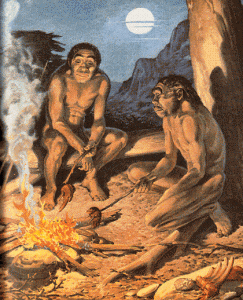Not too long ago, my son’s school sent us a survey. One question asked how well we feel the school is preparing the children for the future. This is a difficult question. At first glance, we see the future as a more technologically advanced version of today with not much changing besides lots and lots of growth.
But if you just look a little deeper, you may remember that we don’t know what the future holds. We have absolutely no clue what it will look like. Most schools are preparing our children for the future pictured above. If that’s what the future indeed holds for my son, then I guess they did okay.
However, there is increasing evidence that that is not what the future will hold. Oil is becoming more difficult to find, of lesser quality, and more difficult to extract. Even if that wasn’t true, calculations of the amount of carbon our atmosphere can tolerate are far below the amount of oil already in the reserves of oil companies. What does that mean? It means we won’t be able to burn all the oil we already know about without catastrophic results. It means oil companies should stop looking for oil, and start putting their resources to better use. It means our future will most likely, out of either (hopefully) proactive or (most likely) reactive necessity, be very, very different than today.
Okay, so what if the future will be very different than today? We still don’t know what it will look like. Nope, we won’t. That’s kind of what makes life fun, right? We can make some educated guesses though. And a lot of people have done just that. It turns out we’re not very prepared.

You see, as technology has advanced through the availability of cheap oil, we have lost almost all of our life-sustaining skills within just a few generations. How many of you know how to build a fire without a lighter or match? How many of you would know how to filter and purify water if a catastrophic event had left you without the devices we use today? What about wood-working without power tools, sewing, knitting, weaving, farming (without things like tractors that run on oil and manufactured fertilizers and pesticides), gathering, preserving food, seed saving, building shelter, heating with wood, and herbalism (making medicine from plants)?
These skills and so many more cannot fall by the wayside. Humans have spent about 200,000 years developing survival methods that have been utilized well up until recent history. Discovering how to make fire and store it was a huge part of our history. Why don’t most of us still know how to do that without the use of just two modern tools, both of which expire?
Discovering how to select the best plants, save those seeds, plant them again, and continue for thousands of years allowed human population to boom. Ancient farmers from what is now Mexico were able to selectively breed a tiny grass seed into a giant grain, corn. Today, scientists have effectively flipped those ancient farmers the bird. 10,000 years of work, and now farmers are told they need to buy a manufactured seed every year in order to have the best yield. We are are forgetting how to save seed, losing heirloom varieties, and forgetting how to care for those varieties that are left. If we lose all our true corn varieties due to cross pollination and loss of interest and something happens to our availability to cheap oil, will corn still exist?
Put simply, there are too many “what-if’s” to allow these skills to disappear. That is where reskilling and skill sharing come in. There are reskilling festivals and expos popping up all over the world. Outdoor skills and wildcrafting classes are available in many places. Here in Sioux Falls, we’ve recently started a group called Sioux Falls Skill Swap. Our intention is simply to learn and share as many skills as possible.
I intend to personally teach my boys every practical skill possible. They will know how to grow food, craft things by hand, start fires, purify water, and build shelters. They will know how to survive, thrive, help others, and stay sane and happy in the process.
But I also hope to help get a couple of these skills into our school, especially gardening. Every single child should know how to grow their own food. Food is more important than Venn diagrams, the Pythagorean theorem, and the date King Henry II died. I’d say that’s my opinion, but it’s not. It’s the truth. Knowledge is the most important asset we can own, but it has to be the right knowledge. If it doesn’t keep us alive, then it might not be the right knowledge.
If you feel the same way, I encourage you to talk to your school about it, get involved in changing some things or implementing some new programs, or simply start reskilling your own kids. You’ll end up learning a lot yourself, and it will be a great bonding experience.